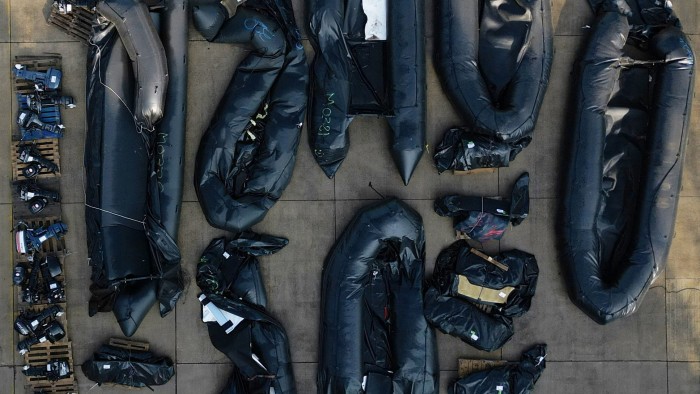Unlock the Editor’s Digest for free
Roula Khalaf, Editor of the FT, selects her favourite stories in this weekly newsletter.
In 2024, at least 69 men, women and children lost their lives trying to reach the UK in small boats across the English Channel, the highest death toll yet recorded. Further south, thousands died crossing the Mediterranean attempting to get to Europe from northern Africa. The International Migration Organisation estimates that around the world, more than 40,000 people have lost their lives making unsafe migration journeys in the past decade. Border crossings have become killing fields.
The title of Nicola Kelly’s new book, Anywhere But Here, is taken from graffiti scrawled on a wall alongside one of the scrub camps in Dunkirk where migrants eke out an existence waiting on their chance of a crossing. Kelly — a journalist and former diplomat who also served time as a Home Office press officer — documents the misery of those seeking refuge in the UK at the hands of people smugglers selling transit in overcrowded, unseaworthy vessels.
For those lucky enough to make it from Syria, Eritrea or Afghanistan to safety on the Kent coast or rescue at sea by the coastguard, the travails of seeking asylum have only just begun. Arrival in the UK is often merely a prelude to a new journey through a Kafkaesque landscape of claiming refugee status. Asylum seekers are met by bureaucratic suspicion and distrust, dealt with by overworked, underpaid caseworkers, and preyed upon by advice sharks and immigration law fraudsters. Their hotel lodgings are besieged by far-right thugs. They are entrusted to the modern security-state of private-accommodation providers and surveillance firms profiting from the immigration business. Removal centres await those whose claims are turned down.
Kelly tells the stories of refugees and migrant workers caught up in this “messy, murky” world of immigration enforcement, asylum management and border control, the better to bring the reality of their lives to public attention. She is a journalist who risks her own security reporting on this dangerous, politically toxic world.
Yet while in the prologue she says that her role is “to report, not opine”, by the afterword she concedes that she cannot disentangle the personal from the political, nor disguise her policy advocacy. Her book is an extended critique of contemporary asylum systems. Although her focus is on the UK, she could be describing the reality of most asylum systems in the developed world.
Designed in a cold war world of restricted movement, these have buckled under the twin pressures of rising numbers of asylum seekers and irregular migrants and increasing public antipathy. This is despite the fact that the vast majority of the world’s refugees are displaced to neighbouring, low-income countries, not the rich economies.
Kelly reserves her most pungent prose for the performative cruelties of the previous Conservative government: millions spent on a scheme to deport asylum seekers to Rwanda, while the system for dealing with asylum cases broke down, massive backlogs built up, public discontent swelled and scores of migrants died in small boats.
She hopes to elicit empathy and common humanity for migrants and refugees. Liberal readers will doubtless offer it; others will be less credulous of some of the asylum seekers’ stories she documents. Nearly a third of asylum claims were rejected last year and popular sympathy for those crossing the channel is limited, at best.
As for policy advocacy, Kelly offers a series of sensible, incremental reforms. She wants to restore access to common European systems of asylum documentation, intelligence-sharing and returns, with more resources for search and rescue and permanently crewed RNLI vessels in the Channel.
Her plea for more spending on local government and training for caseworkers will fall on deaf ears in the current fiscal climate. But allowing asylum seekers the right to work after six months, rather than 12, would reduce accommodation and support costs and bring the UK into line with other European countries.
The holy grail for refugee and migrants’ rights campaigners such as Kelly is a system of safe and legal routes for getting to the UK, similar to those created in recent years for Ukrainians, Afghans and Hongkongers. In 2024, 79,000 grants of leave were offered for people coming to the UK via these routes. They did not have to risk life and limb to arrive. Yet the likelihood of any British government offering safe routes to the nationalities of all those currently coming across the channel in small boats is close to zero.
Some other solution, involving a mix of deterrence, border security and limited resettlement visas, similar to the deal struck with France to close the Sangatte camp in 2002, is more likely. Meanwhile, the cost of the asylum system is counted, not just on Treasury spreadsheets, but in rubber boats that sink in the silver sea of the English channel, taking their human cargo down with them.
Anywhere But Here: How Britain’s Broken Asylum System Fails Us All by Nicola Kelly, Elliott & Thompson, £20, 320 pages
Nick Pearce is professor of public policy at the University of Bath
Join our online book group on Facebook at FT Books Café and follow FT Weekend on Instagram and X




